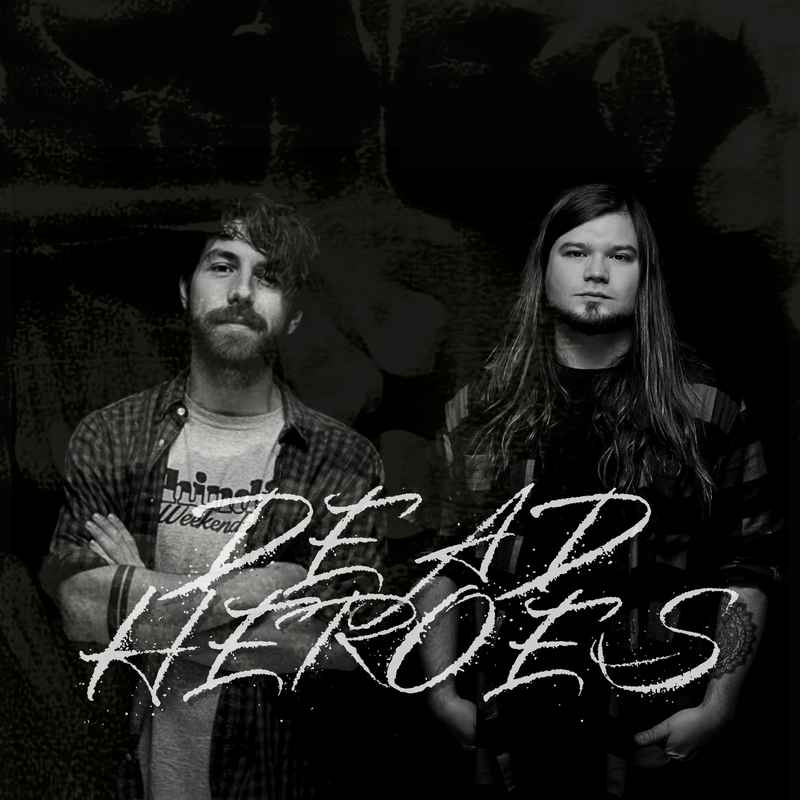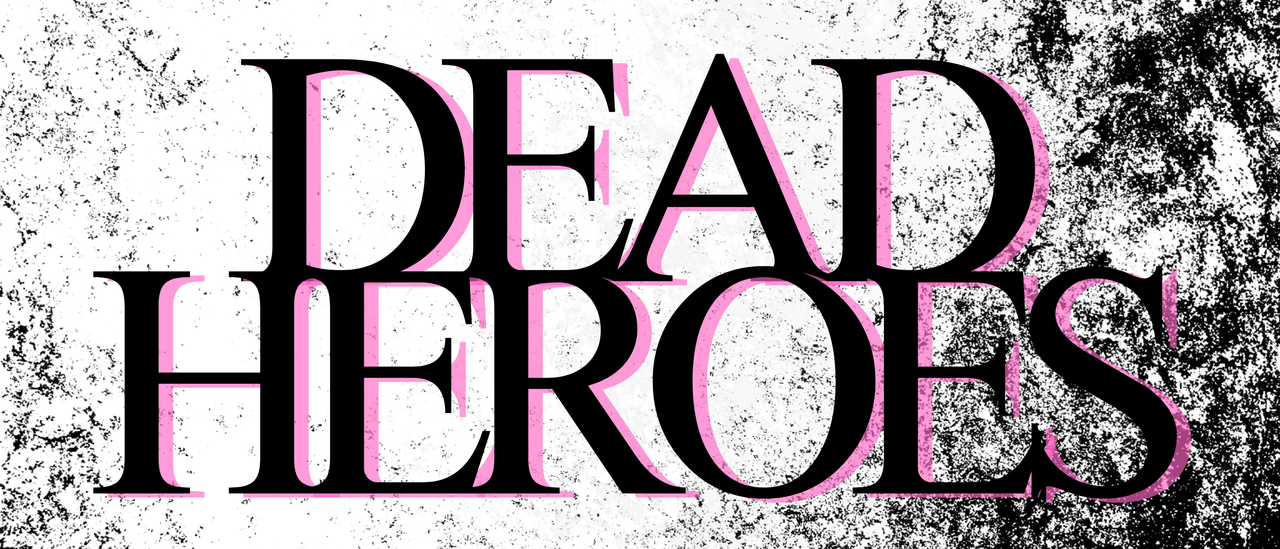Artists Interview: Dead Heros
Welcome to a special look into the world of Dead Heroes, the new alt-rock project from musicians Harry and Zoot. Known for their work in bands like Solcura and DELTORERS, the duo is now channeling a new kind of creative energy, described as "voodoo-soaked alt-rock." We had a chat with them to discuss their collaboration, the inspiration behind their debut single "Witch Doctor," and what fans can expect from this exciting new chapter.
Q. What inspired you to collaborate on this new project, and how does your experience working together in the past influence your music?
A. We've been working together on demos here and there since we were just kids of about 15 years old, helping each other out with our different projects and bands. But for one reason or another, we never properly ended up in a band together—one that was purely of our own direction! We had so much material just lying around, not properly mixed or mastered and not being listened to, and we just thought these songs were awesome and wanted to get them out there at long last! Hence…Dead Heroes.
Q. Your sound has been described as "voodoo-soaked alt-rock". Can you walk us through the creative process behind this unique sound?
A. We really don’t tie ourselves down to any specific vibe or tone, but “Witch Doctor” definitely has a bit of that voodoo magic to it. It came from a really organic place, jamming with a riff from Zoot here, a vocal hook from me (Harry) there. Then we thought of adding in some misc percussion just because we were having fun with it and the song sort of called out for it. Before we knew it, this song developed with an almost sinister, funky, pseudospiritual vibe, and it really evokes a strange feeling of mysticism and ethereality.
Q. How do you balance the darker themes in your music with the catchy hooks and melodies?
A. I think the two have often been used as a really effective juxtaposition throughout the history of music. A great example is “Pumped Up Kicks” by Foster The People. Having a catchy, upbeat hook that plays over lyrical themes that are naturally much darker can elevate both parts in turn. That said, it wasn’t ever really intentional or directed; it just happened naturally as the music and lyrics came together.
Q. What role do the guitar riffs and bass grooves play in shaping the overall mood of your songs?
A. It depends on how the song gets started, really. Some songs are born from a particular vocal line, a beat, a riff, or some other element that gets us inspired. In a lot of our material, the central riff is really the keystone of the song, so it can play a grand part of the process at times. Bass grooves as well! Super important. That’s the part everyone is dancing to, whether or not they know it.
Q. You've mentioned drawing inspiration from bands like Queens of the Stone Age and Gorillaz. How do you think your sound compares to these influences?
A. We definitely take a lot of inspiration from the attitude and energy of bands like QOTSA, and the genre-bending creativity of Gorillaz, but we obviously don’t want to sound like a copy of anyone. The amount of ourselves we pour into everything we make ensures that we have our own, unique sound. If anything, those influences give us permission to follow our gut musically, leading by example of having no rules, boundaries, or templates. Whether that leads us to a filthy desert-rock riff or a weird, trippy groove, we’ve taken bits of their ethos and unavoidably funneled it through our own experiences. It’s always recognizably us, even if you can hear little echoes of those bands we adore here and there.
Q. Can you tell us about the story behind your debut single "Witch Doctor"? What inspired the lyrics and composition?
A. It started as this hypnotic riff Zoot had lying around—literally just the first part and into the heavy section, which had such a swampy, ritualistic feel to it that we couldn’t ignore. Lyrically, I leaned into that imagery: witch doctors, strange ceremonies, that kind of surreal, supernatural energy. There are a few lyrical moments in there that are reflective of where we were at the time, writing the song in front of the computer, things like moving house or smoking too much, insecurities, and happiness in equal measure, too. It was more about evoking that strange, intoxicating vibe, though, where you’re not sure if you’re being healed or cursed. The whole song kind of plays with that tension.
Q. How does your experience in other bands, such as Solcura and DELTORERS, influence your approach to music in Dead Heroes?
A. Definitely. Playing in different projects teaches you so much—songwriting, arrangement, working with different personalities, trusting your instincts. With Solcura, for example, we really honed in on layering melodies and harmonies so they felt organic, keeping true to that 90s DIY, “everything raw” vibe. DELTORERS was all about energy and performance, with a hypnotic, darker edge. Dead Heroes feels like the culmination of all that experience and more, with the freedom to get weird with it and really push into new territory. And of course, we love a good riff.
Q. What can fans expect from your live performances, and how will you showcase your music in a live setting?
A. Right now, Dead Heroes is strictly a studio project. We’re focusing entirely on writing, recording, and releasing music that hits as hard as it possibly can in that format. That’s where all our energy is going. We have the long-term goal of taking these songs to the stage when the time is right, but for now, it’s about creating something that exists purely in the recorded world and making that as immersive and exciting as possible.
Q. You're stepping into darker territory with Dead Heroes. Can you elaborate on what this means for your music and artistic vision?
A. It’s not about being “dark” for the sake of it. It’s more that we’re not afraid to explore themes that might be uncomfortable or strange, because life is uncomfortable and strange sometimes. Musically, it gives us a chance to tap into moods and tones we might have avoided before or maybe not fully realized. There’s a lot of power in that. Sometimes the darker, more mysterious side of things brings out the most interesting melodies and rhythms, and certainly allows for deeper, more mature lyrical content.
Q. How do you stay motivated and inspired as artists, and what drives your creativity?
A. We both just genuinely love writing and playing music together and inspire each other to no end. It’s something we’d be doing whether or not anyone was listening. Inspiration comes from everywhere: a weird dream, a film, a random bassline that pops into your head in the shower. It helps that we’re constantly bouncing ideas off each other and invariably really enjoy what the other creates, which keeps the creative spark alive. The drive is simple: we want to keep making stuff that excites us first and foremost.
Q. What was the recording process like for "Witch Doctor," and how did you capture the desired sound?
A. It was pretty organic. We built it layer by layer, starting with that central riff and letting everything else grow around it. A big part of capturing the sound was not over-polishing it. We wanted that grit and texture to stay intact. There’s some interesting percussion in there, a few unconventional recording tricks, and a lot of focus on making it feel alive and dynamic.
Q. Can you walk us through your songwriting process, and how you come up with new ideas?
A. There’s no single formula by any means; it can start from any direction. We might start with a riff, a vocal line, even just a mood or phrase. Sometimes one of us will bring a half-formed demo; sometimes we’ll jam something out from scratch. The main thing is that we follow the vibe rather than forcing a song into a specific shape. If it feels good, we chase it, and sometimes you end up having to subtract rather than add anything in order to let the song really shine.
Q. How do you think your music fits into the current alternative rock scene, and what sets you apart?
A. I think it fits in the sense that alternative rock right now is pretty wide open. There’s a lot of room for different sounds and ideas, no wrong answers. We are immeasurably blessed with the bands in this genre that have come before, and the context of alt-rock is so massive. What sets us apart is probably that mix of swampy, groove-driven rock with those oddball, almost psychedelic touches. We’re not afraid to be strange, and that’s part of the fun. If it ain’t fun, why are you doing it?
Q. What are your plans for the future, both in terms of music releases and live performances?
A. Honestly, we’re not trying to slot neatly into any particular corner of the scene right now. Since Dead Heroes is a studio-only project at this stage, we’ve got the freedom to make exactly what we want without worrying about how it’ll translate live or fit into a certain trend. Later down the line, we’ll definitely make these songs work in a live setting, but for now we just want to create and release as much music as possible! More singles to come, and hopefully an album before too long.
Q. With "Witch Doctor" dropping on September 26th, what can fans expect in the lead-up to the release, and how will you be promoting your music?
A. We’ll be teasing bits of the track, sharing some behind-the-scenes stuff from the recording sessions, and generally building that sense of anticipation. We want people to feel part of the process, not just see the finished product drop out of nowhere. Expect some weird visuals, maybe a few cryptic posts, and plenty of noise about the release date on our Instagram, for this upcoming track and many more to come!



Comments
Post a Comment